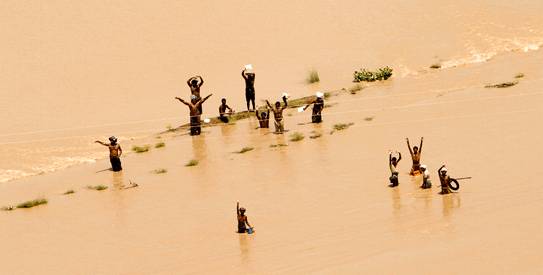ISLAMABAD: ‘Pakistan ranks among the top ten countries vulnerable to climate change. It is losing billions of dollars each year because of floods, heat waves, cyclones, GLOFs and flash floods. This national conference will sensitize policy-makers to integrate Sustainable Development Goals (SDGs) and climate resilient policies in developmental plans, so that Pakistan can progress on the path of low-carbon growth’.
The CEO of Leadership for Environment and Development (LEAD) Pakistan, Mr. Ali Tauqeer Sheikh, said this, while addressing a National Conference on “Integrating SDGs and Climate Change for Resilient Pakistan” organized by LEAD Pakistan and Pakistan Red Crescent (PRC) in collaboration with Red Cross/Red Crescent Climate Centre.
Mr. Zahid Hamid, Federal Minister for Climate Change also spoke on the occasion. ‘Pakistan has enacted several pieces of national policy initiatives in the areas of forestry, energy conservation, disaster management, renewable energy development, among others. These policies integrate scientific climate information into development priorities’.
‘Climate change is affecting every sector of Pakistan, whether it be agriculture, industry or exports. Pakistan lost more than US $ 2 Billion due to extreme weather events, according to the think tank, German Watch. I appreciate Pakistan Red Crescent, International Federation of Red Cross and Red Crescent Societies (IFRC) and LEAD Pakistan for organizing this event, and hope that Pakistan Coalition for Resilience will be a huge success’ added Mr. Zahid Hamid.
Dr. Saeed Elahi, Chairman, PRC, said, ‘Pakistan Red Crescent as a part of International Federation of Red Cross and Red Crescent Societies, is on the front line of disaster response. It recognizes the urgent need for and commits to better manage the rising risk of extreme events, by improving early warning systems, and through better disaster relief and risk reduction and climate-smart programmes for healthcare, water, sanitation, and food security’.
Dr. Saeed Elahi further said, ‘In order to address these increasing challenges in Pakistan, PRC, in line with the IFRC’s transformative One Billion Coalition for Resilience initiative invites everyone to be agents of change to create more resilient communities and transform the humanitarian system seeking ever-greater resources every year to save more lives’.
Basharat Saeed, Coordinator, Climate Change Programme, LEAD-Pakistan, spoke on the capacity of Vision 2025 to steer Pakistan towards meeting its SDG targets. He stressed on the need to acknowledge linkages between water, food, energy and climate change and to cease operating within institutional silos, in favour of the ‘nexus’ approach towards development planning and coordination. He ended by identifying land tenure security and health impacts of climate-induced disasters as examples of cross-cutting issues that are at the heart of Pakistan’s struggle to develop and become climate-resilient.
Dr. Rizwan Naseer, SI Secretary General, PRC, said that PRC has launched the Pakistan Coalition for Resilience to provide an opportunity to pool resources and support for local actions on Resilience, amongst the Red Crescent, United Nations, civil society, academia, national and local government, the business community and volunteers.
Leading experts from government, development sector and international organizations participated in the conference including Ms. Donna Mitzi D. Lagdameo, Technical Advisor, Red Cross / Red Crescent Climate Centre; Ms. Bella Evidente, UN-Habitat; Dr. Ishrat Husain, Ex-Governor, State Bank of Pakistan, Dean IBA, Karachi, and Board Member, LEAD Pakistan; Dr. Ghulam Rasool, DG, Pakistan Meteorological Department (PMD); Dr. Qamar-uz-Zaman Chaudhry, Climate Change Expert; Dr. Muhammad Ashraf, Chairman, Pakistan Research Council for Water; Ms. Javeria Afzal, OXFAM Novib Pakistan; and Dr. Ejaz Ahmad, Senior Director, WWF-Pakistan.






